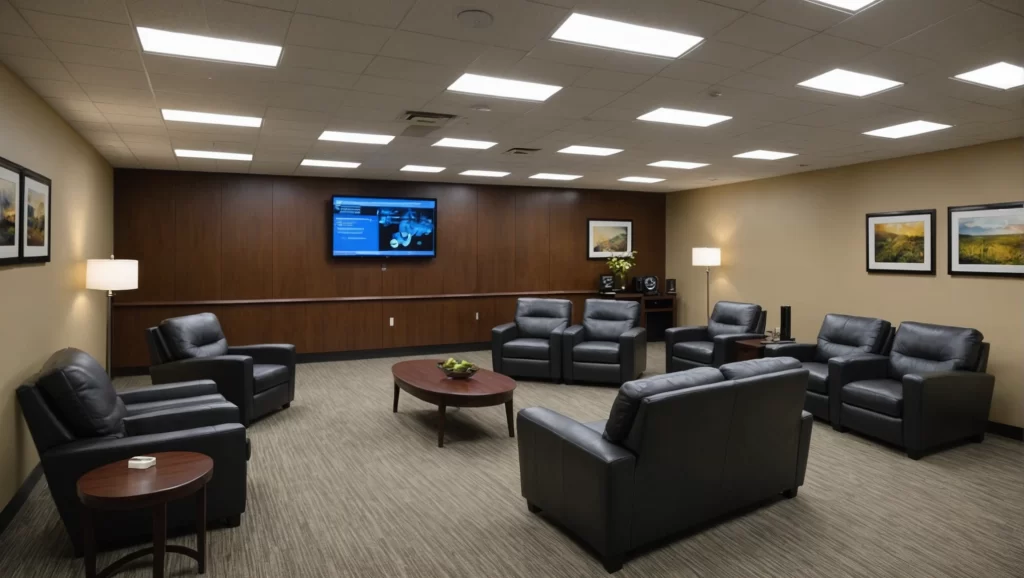Addiction therapy is a transformative journey that many individuals must undertake to achieve lasting recovery from substance use disorders. In Ohio, the need for effective addiction treatment has become increasingly vital as communities grapple with the ongoing challenges of addiction. Through a blend of evidence-based practices, supportive environments, and complete care, addiction therapy can pave the way for a healthier, more fulfilling life. This blog will explore the various facets of addiction therapy, the services offered in Ohio, and the best practices that contribute to successful recovery.
Key Takeaways:
- Addiction therapy is essential for addressing the root causes of substance use disorders, providing support for long-term recovery.
- Ohio offers a range of addiction treatment centers with diverse programs, including day treatment programs in Columbus, Ohio.
- Selecting the best addiction treatment center requires consideration of licensing, treatment options, and aftercare support.
- Family involvement is critical in the recovery process, promoting healing and understanding.
- complete approaches to addiction therapy services enhance recovery outcomes by addressing the individual’s overall well-being.
Understanding Addiction Therapy
Addiction therapy encompasses various treatment modalities aimed at helping individuals overcome substance use disorders. This type of therapy goes beyond merely addressing physical dependence on substances; it delves into the psychological, emotional, and social factors that contribute to addiction.

What is Addiction Therapy?
Addiction therapy involves a structured program that includes counseling, support, and educational components personalized to each individual’s needs. The primary goals of addiction therapy are to:
- Identify Underlying Issues: Therapy helps uncover the root causes of addiction, such as trauma, mental health disorders, or environmental factors.
- Develop Coping Strategies: Individuals learn effective coping mechanisms to deal with stressors and triggers that may lead to substance use.
- Build a Support Network: Therapy often encourages connection with peers and family members, fostering a sense of community and shared understanding.
The Importance of Addiction Therapy in Recovery
Engaging in addiction therapy is crucial for achieving long-term sobriety. Research shows that individuals who participate in therapy are more likely to remain sober and avoid relapse compared to those who do not receive professional support.
Benefits of Addiction Therapy:
- Personalized Care: Each treatment plan is personalized to the individual’s unique circumstances, ensuring that therapy addresses specific needs.
- Accountability: Regular sessions with a therapist provide accountability, helping individuals stay committed to their recovery goals.
- Skill Development: Therapy teaches practical skills that are essential for maintaining sobriety, including stress management and emotional regulation.
- complete Support: Many therapy programs incorporate various forms of treatment, including medical, psychological, and social support, to address all aspects of addiction.
Types of Addiction Therapy Available in Ohio
In Ohio, numerous addiction treatment centers offer a range of therapy types, each designed to cater to the diverse needs of individuals seeking recovery.
1. Individual Therapy
Individual therapy is a one-on-one session between the therapist and the individual, focusing on personal issues related to addiction. This setting allows for personalized attention and personalized strategies that meet the individual’s unique circumstances.
- Cognitive Behavioral Therapy (CBT): One of the most common forms of individual therapy, CBT helps individuals recognize and change negative thought patterns that contribute to addiction. It equips individuals with tools to handle triggers and prevent relapse.
- Motivational Interviewing (MI): MI is a client-centered approach that enhances an individual’s motivation to change. This technique helps individuals explore their ambivalence towards recovery and find their intrinsic motivation to engage in treatment.
2. Group Therapy
Group therapy involves multiple individuals sharing their experiences and supporting one another. This setting provides a sense of community and encourages individuals to learn from others facing similar challenges.
- Support Groups: Groups like Alcoholics Anonymous (AA) and Narcotics Anonymous (NA) offer structured support for individuals in recovery. These groups emphasize shared experiences and accountability.
- Psychoeducational Groups: These groups focus on educating participants about addiction, coping strategies, and healthy living, empowering individuals with knowledge to support their recovery.
3. Family Therapy
Addiction affects not only the individual but also their loved ones. Family therapy addresses the dynamics that contribute to addiction and fosters healthier relationships.
- Family Counseling: Involving family members in therapy sessions can help rebuild trust and communication. Family therapy provides a safe space for members to express their feelings and work towards healing together.
- Family Education: Educating families about addiction and recovery can reduce stigma and promote understanding. It equips them with tools to support their loved one effectively.
4. complete Therapy
complete therapy focuses on treating the individual as a whole, integrating physical, emotional, and spiritual aspects of recovery.
- Mindfulness and Meditation: These practices promote relaxation and help individuals manage stress, enhancing their overall well-being and resilience against triggers.
- Art and Music Therapy: Creative therapies allow individuals to express themselves non-verbally, providing a therapeutic outlet for emotions and fostering self-discovery.
5. Medication-Assisted Treatment (MAT)
For some individuals, medication may be necessary to support their recovery. MAT combines medications with counseling and behavioral therapies to treat substance use disorders.
- Opioid Dependence: Medications like methadone and buprenorphine can help manage withdrawal symptoms and cravings for those struggling with opioid addiction.
- Alcohol Use Disorder: Medications such as naltrexone can help reduce cravings for alcohol and support individuals in maintaining sobriety.
Choosing the Right Addiction Treatment Center in Ohio
Selecting the right addiction treatment center is a pivotal step in the recovery process. With numerous options available in Ohio, particularly in cities like Columbus, it’s essential to evaluate each center carefully.
Key Factors to Consider:
- Licensing and Accreditation: Ensure that the center is licensed by the state and accredited by reputable organizations, which signifies a commitment to quality care.
- Types of Services Offered: Review the types of addiction therapy services provided. A complete center will offer a range of therapy options, including individual, group, and family therapy, along with complete approaches.
- Qualified Staff: Look for centers staffed by certified professionals, including licensed counselors, therapists, and medical personnel with experience in addiction treatment.
- Aftercare Programs: A successful recovery journey extends beyond initial treatment. The best addiction recovery centers provide robust aftercare support to help individuals maintain sobriety after leaving the program.
- Treatment Philosophy: Consider the center’s approach to addiction therapy. Some may focus on a 12-step model, while others may use a more complete or evidence-based approach. Find a philosophy that resonates with your personal beliefs and values.
- Location and Environment: The environment can significantly impact recovery. Choose a center that provides a peaceful, supportive setting conducive to healing.
Top Addiction Recovery Centers in Columbus, Ohio
When searching for addiction treatment in Ohio, consider the following top centers known for their complete care and success in helping individuals achieve recovery:
- Ridgeline Recovery: Offering personalized care with a focus on complete approaches, Ridgeline Recovery provides a supportive environment for individuals seeking recovery from substance use disorders.
- Ohio State University Wexner Medical Center: Known for its research-driven approach, this center offers a range of treatment options, including specialized services for co-occurring disorders.
- The Recovery Village Columbus: This center offers a full continuum of care, including detox, inpatient, outpatient, and aftercare programs, ensuring individuals receive the support they need at every stage of recovery.
Addiction Therapy Process: What to Expect

Understanding what to expect during the addiction therapy process can help individuals feel more prepared and at ease as they begin their journey towards recovery.
1. Initial Assessment and Intake
The recovery process often begins with an initial assessment, where professionals evaluate the individual’s substance use history, mental health status, and other relevant factors. This intake process helps create a personalized treatment plan personalized to the individual’s needs.
2. Detoxification
For many individuals, detox is the first step in the recovery journey. Medically supervised detox can help individuals safely manage withdrawal symptoms associated with substance cessation. Detoxification may occur in an inpatient setting, allowing for 24/7 medical support.
3. Engagement in Therapy
Once detox is completed, individuals will begin participating in addiction therapy. This can involve:
- Individual Therapy Sessions: One-on-one sessions with a therapist to explore personal issues related to addiction.
- Group Therapy: Engaging in sessions with peers to share experiences and build a supportive community.
- Family Involvement: Family members may be invited to participate in therapy to improve relationships and support systems.
4. Relapse Prevention Planning
As individuals progress through therapy, they will work on developing relapse prevention strategies. This may include identifying triggers, creating a support network, and practicing coping skills to handle challenging situations.
5. Aftercare and Continued Support
After completing the primary treatment program, individuals will transition to aftercare, which may involve ongoing therapy, support groups, or participation in sober living environments. Aftercare is essential for maintaining sobriety and preventing relapse.
The Role of Family in Addiction Recovery
Family involvement plays a crucial role in the success of addiction therapy. Addiction can have a profound impact on family dynamics, and including family members in the recovery process can facilitate healing and understanding.
Benefits of Family Therapy
- Improved Communication: Family therapy encourages open dialogue, helping to repair strained relationships and foster understanding.
- Support Network: Families learn how to provide support without enabling addictive behaviors, creating a healthier environment for the individual in recovery.
- Education on Addiction: Family members gain insight into the nature of addiction, which can reduce stigma and enhance their ability to support their loved one effectively.
How to Involve Family in the Recovery Process
- Encourage Participation in Therapy: Family members should be invited to attend therapy sessions, providing a safe space to express their feelings and concerns.
- Educate Family on Addiction: Resources, workshops, and support groups can help family members better understand addiction and its effects.
- Support Groups for Families: Families of individuals in recovery can benefit from attending support groups, where they can share experiences and learn from others facing similar challenges.
complete Approaches to Addiction Therapy
complete therapy methods are gaining popularity in addiction treatment centers as they address the whole person rather than just the addiction. These methods complement traditional therapies and contribute to overall well-being.
1. Mindfulness and Meditation
Practicing mindfulness and meditation can help individuals develop greater awareness of their thoughts and feelings, reducing stress and anxiety. These techniques teach individuals to remain present and manage cravings or negative emotions.
2. Exercise and Physical Activity
Regular physical activity is vital for overall health and can enhance mood, reduce stress, and improve self-esteem. Many addiction treatment centers in Ohio encourage exercise as part of their complete approach.
3. Nutritional Counseling
Nutrition plays a significant role in recovery. Nutritional counseling helps individuals understand the importance of a balanced diet and how it affects their physical and mental well-being. A healthy diet can aid in the recovery process and support long-term sobriety.
4. Art and Music Therapy
Creative therapies provide alternative means of expression, allowing individuals to explore their emotions and experiences through art or music. These forms of therapy can be particularly beneficial for those who find it challenging to express themselves verbally.
Addressing Co-Occurring Disorders
Many individuals struggling with addiction also face co-occurring mental health disorders, such as depression, anxiety, or PTSD. Addressing these issues in conjunction with addiction therapy is crucial for successful recovery.
Integrated Treatment Approaches
- Dual Diagnosis Programs: Many addiction recovery centers in Ohio offer integrated treatment for individuals with both addiction and mental health disorders, ensuring that all aspects of their care are addressed.
- Therapeutic Techniques: Therapists may employ specific techniques designed to address both addiction and mental health issues, fostering complete healing.
The Importance of complete Care
Providing complete care for co-occurring disorders helps individuals achieve better outcomes. By addressing both addiction and mental health simultaneously, treatment becomes more effective, reducing the risk of relapse and improving overall quality of life.
Building a Support Network
A robust support network is vital for maintaining sobriety after completing addiction therapy. This network can include family, friends, peers from support groups, and professionals who provide ongoing care.
Finding Support in the Community
- Local Support Groups: Organizations like Alcoholics Anonymous (AA) and Narcotics Anonymous (NA) offer ongoing support and connection to others in recovery.
- Sober Living Environments: Many individuals benefit from transitional housing that provides a sober living environment while they continue their recovery journey.
The Role of Sponsors
In programs like AA and NA, sponsors serve as mentors who provide guidance and support to individuals in recovery. A sponsor can help individuals navigate challenges, celebrate successes, and provide accountability.
The Future of Addiction Therapy in Ohio
The landscape of addiction therapy in Ohio is evolving, with new approaches and resources emerging to better support individuals in recovery. As awareness of addiction increases and stigma decreases, communities are becoming more invested in providing effective support systems.
Innovations in Treatment
- Teletherapy: The rise of teletherapy allows individuals to access therapy from the comfort of their homes, making addiction treatment more accessible, particularly in rural areas.
- Mobile Apps: Various mobile applications offer tools for tracking recovery progress, connecting with support networks, and providing resources for managing cravings.
- Community-Based Initiatives: Local organizations are increasingly focused on addressing addiction through community programs, educational workshops, and outreach efforts.

Continued Advocacy and Support
As the need for effective addiction therapy continues to grow, ongoing advocacy is essential to ensure that individuals have access to the resources they need for successful recovery. This includes promoting policy changes, funding for treatment programs, and community education initiatives.
Conclusion: A Journey Towards Lasting Recovery
Addiction therapy is a critical component of the recovery journey, offering individuals the support, tools, and strategies they need to overcome substance use disorders. In Ohio, a range of addiction treatment centers provide complete care personalized to the unique needs of each individual. By embracing therapy, individuals can address the underlying issues of addiction, build a strong support network, and develop the skills necessary for maintaining long-term sobriety.
Whether you or a loved one are seeking addiction treatment in Ohio, now is the time to take action. The journey to recovery begins with a single step, and with the right support, a healthier, more fulfilling life is within reach. Reach out to a local addiction recovery center today to explore the options available for addiction therapy and begin your path to lasting recovery.
Call Us Now!
Get in touch with Ridgeline Recovery Center in Columbus Ohio right now if you or a loved one is looking for help with heroin or alcohol dependency. At Ridgeline Recovery’s Addiction Recovery Center in Columbus, Ohio, we offer hope and healing. With services like Medicaid, MAT, Counseling, IOP, Mental Health Services, and aftercare programs, we guide you towards recovery and a brighter future.
For more stories and information Contact Us, visit our Blog page and Stories & Highlights.



